ANNUAL IMPACT REPORT:
Improving Lives in an Ever-Changing World
A Message from
DR. PEGGY TERHUNE
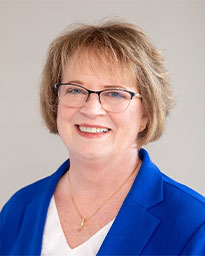
There have been so many milestones in Monarch’s 62-year history. This year, 2020, will certainly go down as one.
On July 1, we began our fiscal year just like any other. We were focused on the launch of a new electronic health record system, which would allow us to better serve the people we support. We were planning for Medicaid transformation in North Carolina. We were excited to graduate a new group of Monarch leaders from our Leadership Academy. Little did we know that just nine months later, virtually everything would change.
In this report, you will see a snapshot of the year and our response to the coronavirus pandemic. You will learn how we made strategic decisions to rapidly expand our telehealth services and adjust program operations with the safety of the people we support and our staff as our main priority. And you will meet our Frontline Heroes who continued to provide services throughout the crisis, knowing they were more important than ever during this time.
I am so proud of Monarch’s 1,867 employees who worked together to ensure that we were able to effectively respond to the many challenges at hand. It was truly a team effort!
While we continue to navigate the ever-changing waters of this pandemic, I am grateful to our state and local partners, community foundations and individual donors for the support we received during the pandemic. Monarch has been a strong organization for the last 62 years and I am happy to report that we remain so, despite the many changes in the world around us.
Sincerely,
![]()
Peggy S. Terhune, Ph.D
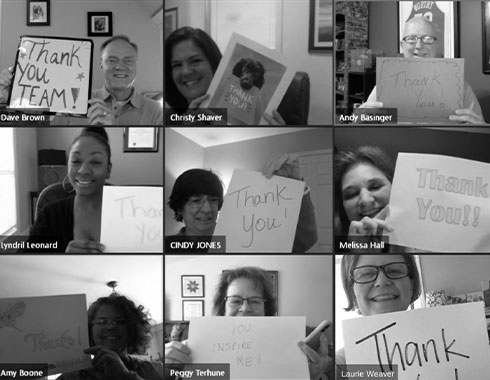
CEO Peggy Terhune (bottom center) is joined by Monarch leadership in sending a virtual thank you to hardworking staff members in the early days of the pandemic.
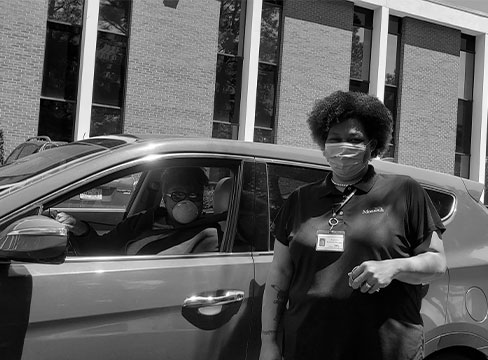
Residential Manager Donyelle Haywood and Residential Manager Regina Love made a visit to Monarch’s “hand sanitizer filling station” in Mecklenburg County in May. Four stations were set up across the state to distribute needed supplies, including more than 10 gallons of hand sanitizer.
Our Mission
Monarch is committed to supporting, educating and empowering people with developmental and intellectual disabilities, mental illness and substance use disorders to choose and achieve what is important to them.
MONARCH'S
Annual Impact
32,286
PEOPLE SERVED
47% 53%
MALE FEMALE
31,399
PEOPLE WHO RECEIVED MONARCH'S BEHAVIORAL HEALTH SERVICES
1,417
PEOPLE SUPPORTED WHO RECEIVED DAY PROGRAM AND SUPPORT SERVICES

721
PEOPLE WHO RECEIVED RESIDENTIAL SERVICES
392,987
PATIENT ENCOUNTERS
95
COUNTIES SERVED
710
ZIP CODES REPRESENTED AMONG PEOPLE SUPPORTED
186
SITE LOCATIONS
Financial Summary
TOTAL REVENUE $84,731,996
$43,949,256
$30,073,851
$572,032
$517,514
$188,183
$5,704,574
$2,101,932
$1,624,654
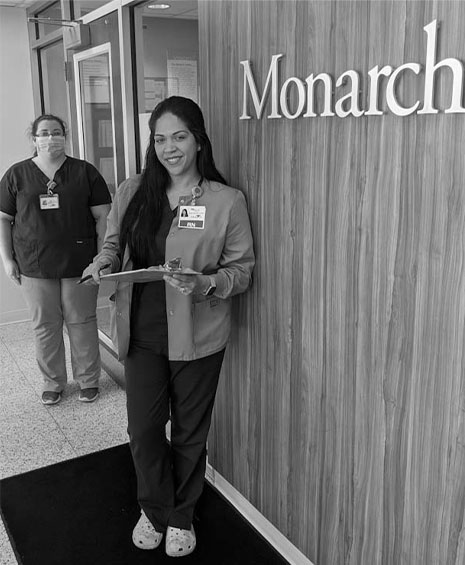
Monarch’s facility-based crisis services, like those at Tanglewood Arbor in Lumberton, remained open throughout the pandemic.
THE IMPACT OF
Immediate Response
In March, as the coronavirus pandemic became a reality for the United States, Monarch made significant operational changes to ensure the health and safety of the people we support and our staff. As a long-time provider of telehealth services, we were able to rapidly expand our telehealth network, transitioning people from in-person office visits to virtual visits via telephone, computer or mobile device. We also adjusted services at our long-term services and support sites, including our day programs, suspending on-site activities and transitioning care to individual homes when we could.
A number of our services are critical in nature and cannot be provided virtually. Our dedicated staff continued to provide face-to-face services when and where possible. Using personal protective equipment (PPE) and following safety protocols, our staff supported individuals with intellectual and developmental disabilities in our group homes and through one-on-one support in the community. We continued to help individuals with severe and persistent mental illness manage that illness at medication injection clinics and through community-based services.
Despite the many challenges faced this year, our commitment to provide compassionate care to the people we support remained steadfast.
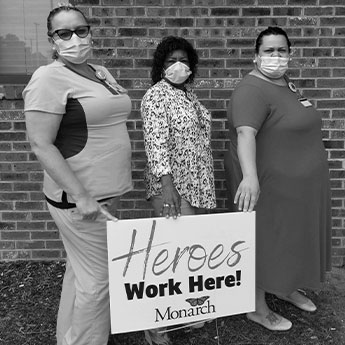
Licensed Practical Nurse Sabrina Dial, Referral Coordinator Deborah Wilson, and Medical Assistant Melissa Freeman provide support at Monarch’s Behavioral Health Outpatient Office in Lumberton.
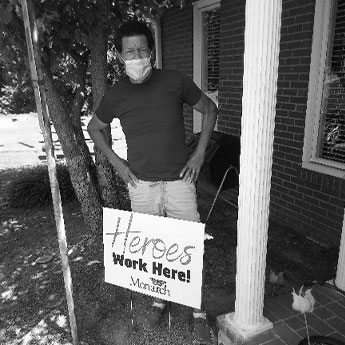
Direct Support Professional Hubert Burns works with people we support at CHOICES on the Ridge Day Program in Winston-Salem.
COVID-19 RESPONSE
By the Numbers
(through June 30)
34,807
Virtual (telehealth and telephone) visits between March 1 and June 30, 2020, an increase of more than 600% over the same period in 2019.
1,000
Staff members continued to provide direct, face-to-face care to people we support.
60,500
Masks and 570 boxes of gloves purchased beyond typical supplies to provide personal protective equipment to direct care staff.
18,288
Emails delivered to people we support and Monarch families, friends and donors with COVID-19 updates and information.
$116,000
Raised in private support from individual donors and foundations, including the SECU Foundation, The United Way of Greater Greensboro, The United Way of the Greater Triangle and The Community Foundation of Gaston County.
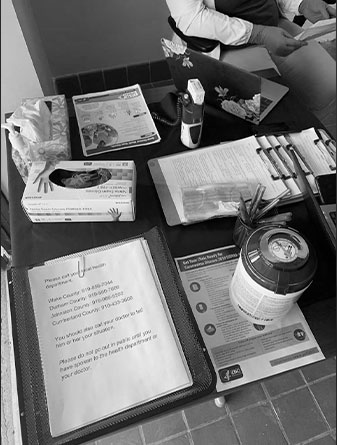
Across Monarch, use of personal protective equipment, including masks and gloves, and advanced cleaning procedures became part of new safety protocols implemented to ensure the health of people we support and our staff.
MONARCH'S
#FrontlineHeroes
Monarch Staff Perfected the Art of “Staying Safe While Staying In” for People We Support
Monarch’s dedicated group of residential and day program staff faced unique challenges during COVID-19. Following necessary changes in programs and services, the people we support, who are used to being involved in the community, volunteering or working, were now at home. Routines and schedules were very different than they were used to. And like all of us, the people we support experienced many emotions with those changes.
Monarch’s residential and day program staff were remarkable in helping the people we support remain active and engaged. They coordinated extra telephone calls and video conferences to keep the people we support in touch with family members and friends and they developed a variety of creative at-home activities to help break up the day.
Residential Manager Holly Jaynes shared that the residents at Montgomery Home in Troy had fun while “staying safe while staying in!” They enjoyed an indoor bowling tournament and backyard activities like playing corn hole and spending time on the swing. They even tie-dyed T-shirts! (Pictured right.)
At Health Drive Day Program in New Bern, April Judson, community engagement team leader, and her team hosted the program’s regularly scheduled bingo game via GoToMeeting. Program participants joined from their homes and played using bingo cards that had been mailed to them. April used a free online bingo number generator to support the game. This was a great way to connect people we support with their friends!
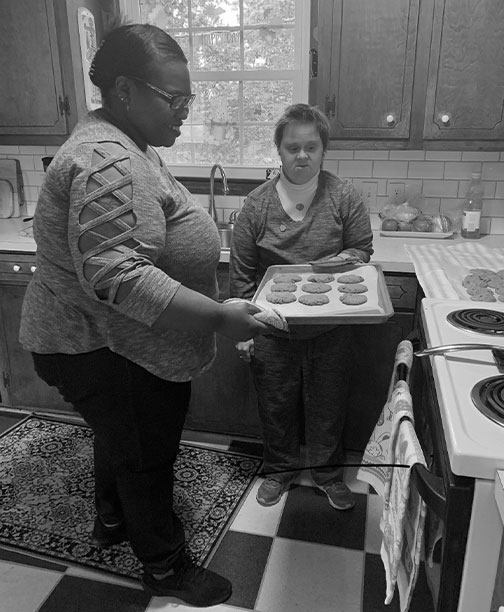
Baking is one of Sara Smoak’s favorite activities and she and Developmental Specialist Courtney Ledbetter continued to cook together at Sara’s home during the pandemic.
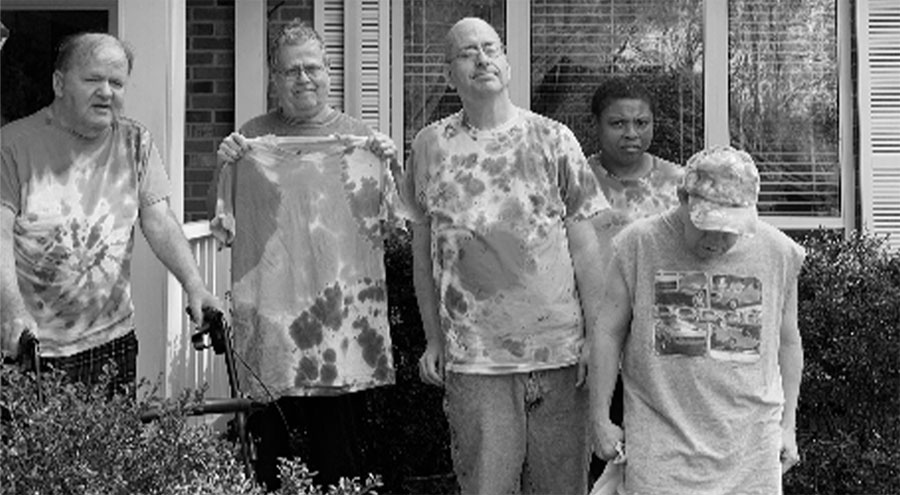
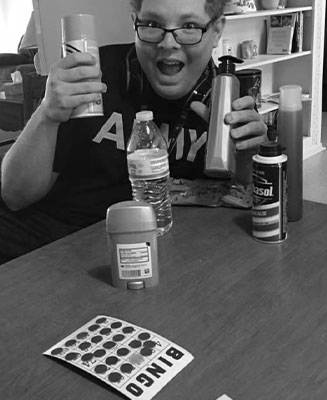
Alex Baker, a resident at Connecticut Avenue Home in Southern Pines, shows off the prizes he won during a game of bingo with housemates.
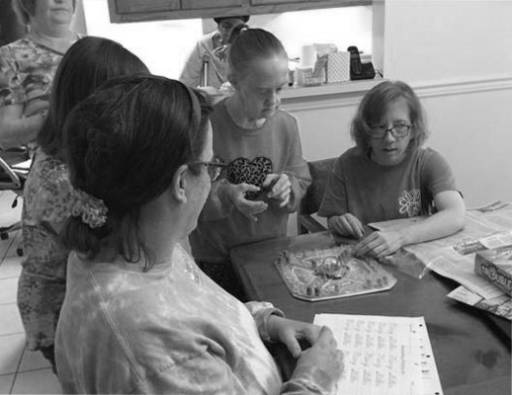
Residents at Hoke Street Home in New Bern enjoyed time together playing games and participating in a scavenger hunt.
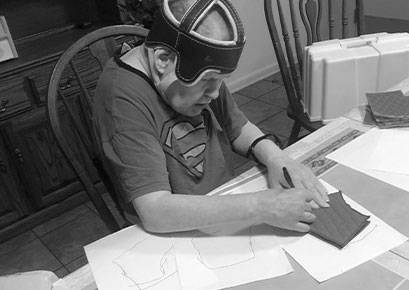
Greg Terry, a resident at Monarch’s Anderson Road home, joined staff in making masks to share with group home residents and Monarch staff. His job measuring and tracing patterns was an important part of the operation.
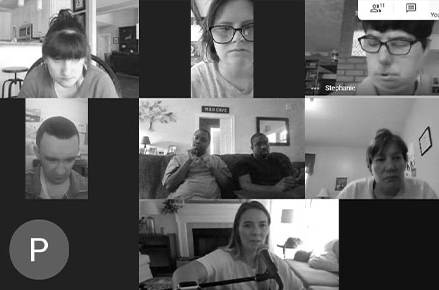
Despite the challenges posed by the coronavirus, the music continued at Monarch’s Creative Arts and Community Center in Southern Pines as the Monarch Voices choir practices became virtual. Choir members continued to enjoy time together singing their favorite songs and learning new ones.
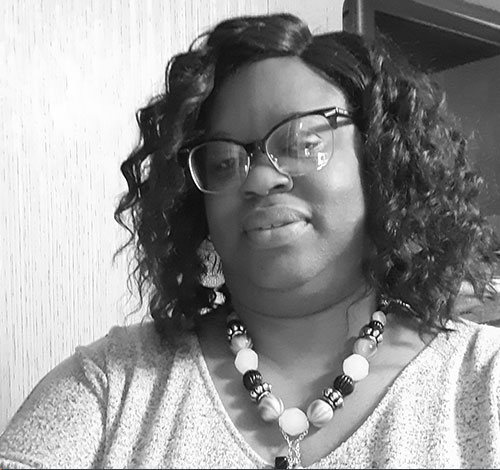
Monica Love
LONG-TERM SERVICES AND SUPPORTS BEHAVIORAL SPECIALIST
Behavioral Specialist Monica Love celebrated her birthday on April 2, and it is sure to be a memorable one as she spent it quarantined and caring for people Monarch supports. Love has supported a husband and wife in a Monarch apartment for 11 years. In late March, the husband contracted the coronavirus after initially being diagnosed with pneumonia.
The couple requires a supported living environment due to behavioral health diagnoses and Love realized that continuity of care would benefit them as the husband recovered from the virus. She offered to provide that care and quarantined in the couple’s home for 17 days, carefully following Monarch’s safety protocols and processes: “I decided that it would be best having worked with them for 11 years. I know the couple well and how they are when they are sick, not feeling well and how they express themselves.”
Love said that she considers the couple like her family and treats them as she would her own. “Their family thanked me and said what a big help it was in making sure their loved ones were safe. I got a lot of thanks from a lot of people,” Love noted.
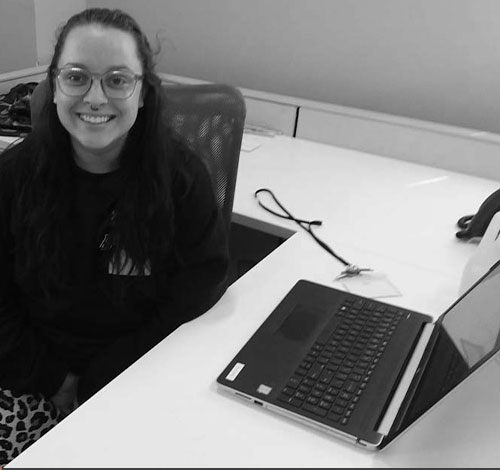
Briannan Snow
BHUC ADMINSTRATIVE ASSISTANT
Behavioral Health Urgent Care (BHUC) Practice Administrator Brian Maxey, M.S.S.W., and his staff knew that the COVID-19 pandemic was causing added stress for individuals seeking help when experiencing a mental health care crisis.
BHUC Administrative Assistant Briannan Snow went above and beyond to assist a young lady experiencing a psychotic episode during a nearly eight-hour visit in April. BHUC visits are typically a much shorter duration, but this situation required assistance from an outside agency, which caused the extended wait. Snow tried a variety of calming techniques during the woman’s stay including providing an ice cream snack, a walk in the parking lot, giving her a hoodie to wear and engaging in conversation to relieve her frustration.
Snow explains that her role is one of support for her BHUC teammates: “I try to treat the people seeking services at BHUC the same way that I would like to be treated if places were reversed. Sometimes compassion can come out of the simplest of gestures and even from a smile.”
Maxey noted that Snow took it all in stride and kept the person seeking services, who ultimately needed hospitalization, safe and calm. “Briannan went above and beyond to care for an individual who at that time was unable to care for themselves. She is truly a frontline hero!”
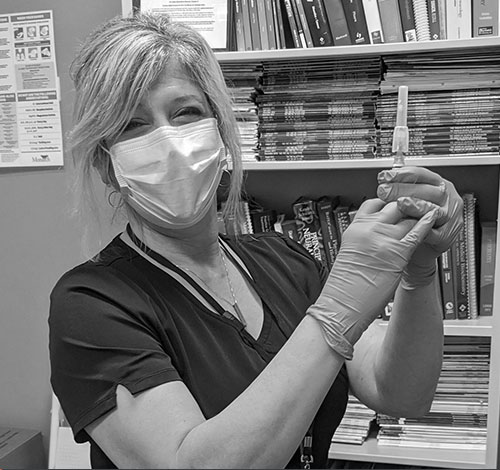
Debra Miller
CCBHC NURSE CASE MANAGER
Certified Community Behavioral Health Clinic (CCBHC) Director of Integrated Care Monique Lucas, BSN, RN, CCM, CCCTM, believes every member of her staff qualifies for the title “frontline hero” during the COVID-19 pandemic, but made special mention of Nurse Case Manager Debra Miller, RN.
As the CCBHC nurse case manager, Miller is responsible for administering the injections as part of the medication-assisted treatment (MAT) program, which is the use of medications in combination with behavioral health therapy to treat opioid use disorders. During the pandemic, Miller took her responsibilities outdoors to keep staff and people we support safe. When Miller administered the MAT injections, she did so in the CCBHC parking lot, adhering to social distancing and personal protective equipment guidelines.
“Throughout the pandemic, Debbie has been a breath of fresh air. A team player, she helps in any capacity possible to assist our staff and the people we support,” Lucas explained. “Through it all, Debbie is making sure safeguards are in place so that the people we support will receive the services they need.”
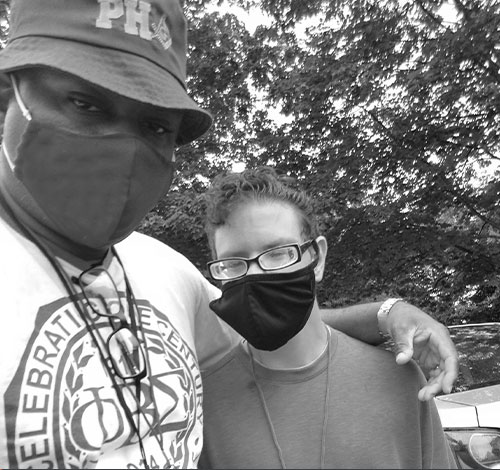
Sean Hawkins
DIRECT SUPPORT PROFESSIONAL
Direct Support Professional (DSP) Sean Hawkins and person supported Zach Kelly, who attends Studio 651 day program, are familiar faces in the Winston-Salem area. The enthusiasm that the pair shows for being an integral part of their community was not dimmed by the coronavirus pandemic. While out and about during the pandemic, Hawkins and Kelly diligently followed safeguarding measures like wearing masks and social distancing.
Inclusion in the community and volunteering to help others assists Kelly in reaching goals he has set for himself, Hawkins explained. Kelly creates a weekly schedule of activities and volunteer opportunities in which he wants to participate, incorporating their personally coined, “Funday Friday,” where a favorite restaurant is selected. “I saw Zach being himself and enjoying being outside in the community, doing something and going places,” Hawkins shared. “Being involved in community efforts helps him be a happier person and able to do things that he likes to do and also being able to share that experience with someone.”
Hawkins speaks passionately about his role and takes to heart the impact DSPs have on individuals supported. In his role, he is reminded often and sees firsthand the gifts and talents that individuals supported want to share with their communities. “Never ever underestimate someone or determine limitations. Never look at someone and say they can’t do something,” he advised.
THE IMPACT OF
Monarch's Services
Each year, thousands of people across North Carolina look to Monarch for treatment and support. Our goal is to have each person receive the care that best meets his or her individual needs. We want to deliver high-quality health care and we want the people we support to feel empowered during the treatment process. Our satisfaction surveys are one more way the people we support have a voice in the care they receive.
We value that feedback.
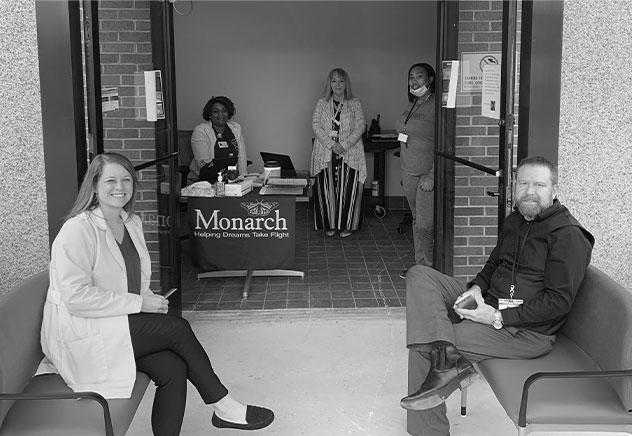
Staff at Monarch’s Wake Behavioral Health Urgent Care established an outdoor COVID-19 screening area to ensure the safety of people we support and staff.
96%
report it was easy to access the care, services or treatment they needed at Monarch.
97%
report they participated in the development of their treatment plan and it reflects what they want it to.
97%
say Monarch gave them the necessary help, support and information that was needed to manage their condition.
97%
say they were treated with courtesy and respect by Monarch staff.
96%
report they are better able to take care of their needs and deal with crises.
96%
say overall they are satisfied with the services and treatment received at Monarch.
97%
would recommend Monarch to a family member or friend.
THE IMPACT OF
Employment
Employment plays an important role in the lives of the people we support. It provides a pathway to greater independence, self-determination and community inclusion for people with intellectual and developmental disabilities. For individuals living with mental illness, successful employment can be a critical part of the recovery process. Often through employment, people experience improvements in their quality of life and self-esteem, which leads to positive outcomes in recovery.
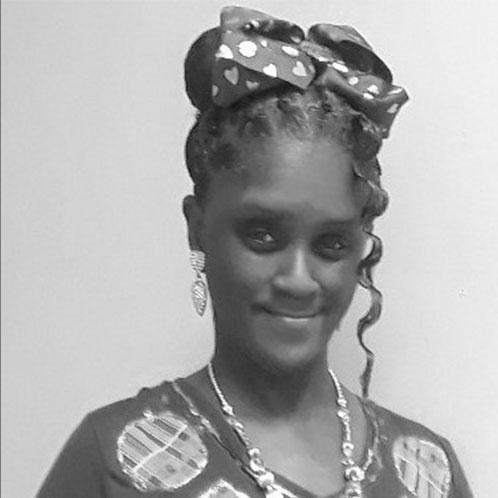
Shonda Bridges
Raeford day care owner and director Cynthia Cockerham-Wright proudly described Shonda Bridges as a phoenix, because she rises to the top and is an exemplary member of her staff.
Bridges works three days a week at Cockerham-Wright’s Creative Children’s Corner day care, a center caring for 37 children ranging in age from three months to 10 years old. She also attends Vocational Options of Hoke County (VOHC), a Monarch day program offering services and programs to individuals with intellectual and developmental disabilities (IDD).
Last summer, Bridges, 47, began her job search in earnest with the help of Daisy Smith, QPBA, QDDP, Supported Employment program manager, Sandhills at VOC, who assists day program attendees in finding employment opportunities.
Smith reached out to Cockerham-Wright, aligning with Bridges’ career goal to work with children. Bridges completed each step of the hiring process with flying colors: filling out the application, meeting for an in-person interview and passing required background checks. Bridges noted that she studied for and passed courses including first aid and cardiopulmonary resuscitation in order to begin working safely with children.
Last August, Bridges started her new role as a classroom assistant at the day care center once a week. Cockerham-Wright thought Bridges was doing so well that she asked her to increase to three days a week. Bridges obliged and now works alongside the classroom teacher with the two- and three-year-old toddlers, reading to the children, assisting with mealtimes and playing one-on-one with them to promote manipulative skills.
“Shonda dives right in. You don’t have to tell her what to do or if you direct her, it’s one time and she completes the task. She is self-initiated and so pleasant to everyone,” Cockerham-Wright said.
Bridges stated she enjoyed having a job that affords her the opportunity to shop for new clothes and visit the hair salon, but above all, loves working with the children. “I make their boo-boos feel better,” she said with a giggle. “I go outside and play games with them and clean them up.”
Cockerham-Wright encouraged business owners to embrace inclusive hiring. “Everybody has something. Nobody is perfect, whether it is a disability you are born with or one that is acquired,” she noted. “I think employment helps build character and confidence. Shonda has brought a bright light to our day care center.”

From Homeless to Hopeful:
John Crankfield was homeless once, and he has come to realize that the best parts of life can be found in the little things: “I am thankful for every day.”
Today, Crankfield now lives in a furnished apartment, is employed and enrolled in business administration courses at Forsyth Technical Community College in hopes of earning a degree.
Crankfield receives Monarch services through the Individual Placement and Support (IPS) staff, which includes Reina Williams-Talley, an employment peer mentor, and Brian Holloway, lead employment support professional, at the behavioral health location in Forsyth County. The IPS staff works in collaboration with the behavioral health professionals to assist people in achieving their personal and professional goals.
During the past year, the pair has watched Crankfield make great strides. “If we made a plan and that was what we set out to complete, we did it. He doesn’t make excuses,” Holloway described Crankfield’s motivation. Homeless while living in Florida and struggling with depressive symptoms, Crankfield initially moved to North Carolina in 2007 to be closer to a sister, who lives near Winston-Salem. He had lived temporarily with a friend’s family and his sister while trying to get back on his feet with a place to live and employment.
His determination has helped him plan for a brighter future. A year ago, Crankfield began working at Dollar General as a cashier/associate with responsibilities that include checking out customers, product replenishment and store organization. Crankfield has not only gained valuable life accomplishments, but in the process gained friends. “Before I was really a lot more depressed and I was dealing with stuff on my own,” he said. “Brian and Reina cheer me on. I feel more secure now. I have really come to look at them as more than sponsors, but friends and confidants.”
Individual placement and support by the numbers
Individual Placement and Support (IPS) services provide support for individuals with mental illness to choose, acquire and maintain competitive employment in the community.
NEW EMPLOYMENT BY COUNTY
- Cleveland: 35
- Guilford: 44
- Forsyth: 36
- Nash: 22
- Robeson: 5
- Stanly: 32
- Wake: 12
The impact of
Philanthropic Giving
Each year, philanthropic giving by Monarch donors shapes our programs and services. Individuals, businesses and philanthropic foundations give of their time and money, helping to strengthen existing programs and establish new ones. Monarch donors touch the lives of each of the more than 32,000 people we support, and we are grateful for their investment in our mission.
$1,720,088
Total Philanthropic Giving in FY2020
76
Giving by Monarch’s Board of Directors:
100% Participation
$15,886
Total Raised in 2019 Staff Giving Campaign
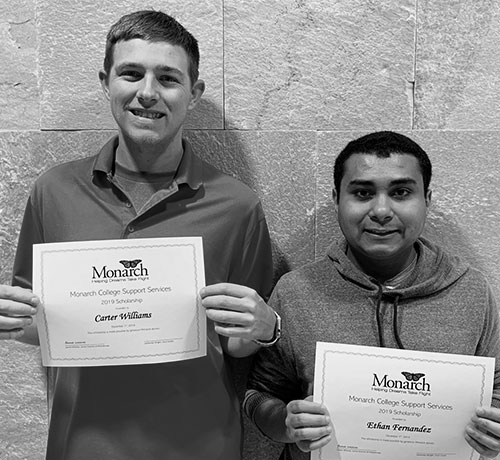
Inaugural Beyond Academics
SCHOLARSHIPS AWARDED
In 2017, UNCG selected Monarch as its partner to provide support services to students with intellectual and developmental disabilities who are enrolled in the Beyond Academics Comprehensive Transition Program. Beyond Academics is part of UNCG’s Integrative Community Studies (ICS) program, which was the first postsecondary program for students with IDD in North Carolina. In 2019, contributions from generous Monarch donors and proceeds from our 2019 Dreams Take Flight Golf Tournament supported scholarships to underwrite the cost of supportive services for deserving Beyond Academics students.
Pictured: Carter Williams and Ethan Fernandez, recipients of Monarch’s 2019 Beyond Academics Support Services Scholarships
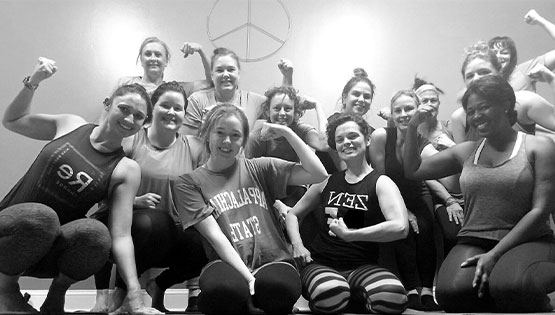
Lincolnton's Yoga on Main
HOSTS BENEFIT CLASS FOR MONARCH
Lincolnton’s Yoga on Main owner Barbara O’Donnell, second from right on the first row, knows firsthand the value of therapy and how it can help in the healing process following a mental health diagnosis. Since she is the owner of Yoga on Main studio, O’Donnell also recognizes the value and impact of incorporating the practice of yoga into daily routines. In February, O’Donnell organized a yoga flow class with proceeds from admission donated to Monarch services. The group class donated $100 to help the people we support. Thank you Yoga on Main and all class participants for stretching for a great cause!
Honor Roll of Donors
Thank you to our corporate partners and sponsors for their continued support!
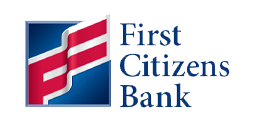


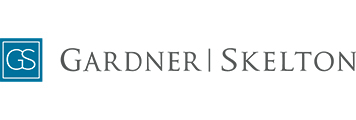

OTHER
Milestone Moments
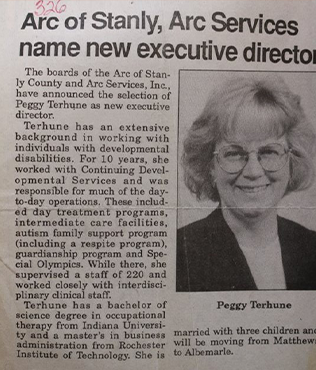
In June of 1995, President and Chief Executive Officer Dr. Peggy Terhune walked into Monarch for the first time. During her 25-year tenure, the company has grown from a small provider serving a single North Carolina county into one that serves more than 32,000 people across most of the state.
When asked to share what she is most proud of, Peggy says, “That’s really hard! There have been so many proud moments. I am proud of our growth, but I am more proud of the reasons behind it – that we are providing support to people who need us. Honestly, the things that mean the most to me are the phone calls or notes from families telling me they never had the support they needed until they found Monarch.It is extraordinary to know that we are impacting lives every day. I’m also so proud of our staff. They are a remarkable group of people and I am inspired by the stories of why they love working for Monarch and what motivates them every day. I’m also proud that they email me when frustrated, and I can often solve whatever challenge they’ve had. It often changes how we do things, and I love that staff have that input!”
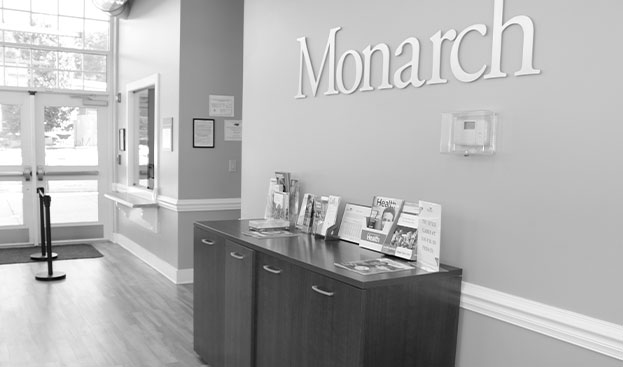
In April, Monarch was awarded an additional two-year, $3.9 million grant to continue support of our Certified Community Behavioral Health Clinic (CCBHC) in Stanly County. The Department of Health and Human Services’ Substance Abuse and Mental Health Services Administration (SAMHSA) allocated the funding to expand vital services for people with serious mental illness and substance use disorders. Funding for this grant is provided through the Coronavirus Aid, Relief, and Economic Security (CARES) Act and will continue through April 2022. “We know that in the wake of COVID-19, the mental health needs of our communities will only increase. This funding will ensure we can respond with comprehensive mental health care and substance use disorder services for people who need it most,” said President and Chief Executive Officer Dr. Peggy Terhune.
As a result of additional funding over the next two years, the CCBHC will serve more than 2,000 people in Stanly County and expand services to include a community-based peer recovery center, occupational therapy services to enhance treatment outcomes and increased community education on mental illness and substance use disorders.
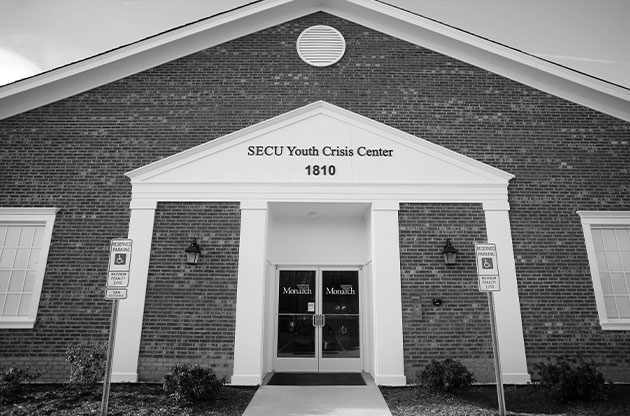
The State Employees’ Credit Union Youth Crisis Center (SECU YCC), a Monarch program, celebrated its two-year anniversary in January and staff could not be prouder of the more than 1,000 youth, and their families, who are thriving after receiving critical mental health services.
The YCC formed thanks to a partnership with Cardinal Innovations Healthcare, as well as state and federal officials, the state’s general assembly and community partners. The SECU Foundation generously provided a one-time grant. Today, children ages 6 through 17 have access to a facility offering timely, age-appropriate mental health care.
As youth mental health issues change across generations, Youth Facility Based Crisis Medical Director Dr. Jacqueline Smith said the YCC will find ways to assist with trending issues such as the impact of social media, sleep issues, gender identity and sexual preference, and dealing with grief due to the death of a loved one.

In February, Monarch launched a new electronic health record (EHR) system, transitioning to the Credible Behavioral Health platform. The system provides several new features including a patient portal and integrated appointment and provider scheduling, all of which will improve access to care and information sharing. The platform is also mobile friendly, increasing access to the system for people we support, therapists and clinical team members who are providing services in home or community settings.
Electronic health record systems are critical for health care companies like Monarch because they provide the platform for documentation of care and treatment and communication with people we support. The EHR is also key in data collection and reporting, which are required by payors and stakeholders. Monarch’s move to Credible increases efficiencies across these areas and will provide streamlined information sharing among clinical teams who provide direct care.
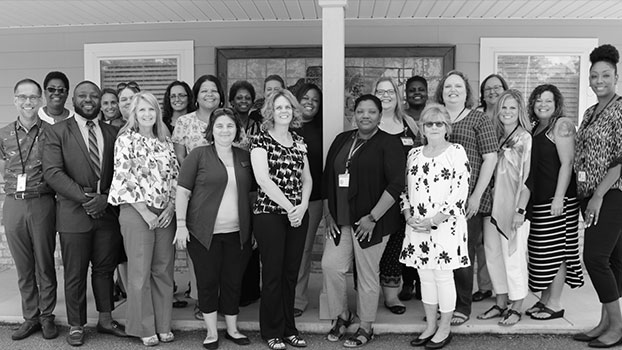
Monarch continued to invest in leadership development for staff and graduated 17 behavioral health team members from its 2019 Leadership Academy in the fall. Participants marked the occasion by making personal presentations about what they learned during the five-month educational program, which covered topics including human resources, customer service and leadership.
This year’s Leadership Academy program was designed to help behavioral health management leaders gain the skills needed to be successful managers within Monarch. It marked a shift in the Academy, which was originally designed for Long-Term Services and Support staff.
The program is unique because each participant takes away a different perspective to bring back to their respective teams. Rocky Mount Behavioral Health Practice Administrator Leigh Daughtridge said that leadership is a team approach and participating in this year’s Leadership Academy has assisted her in strengthening that concept. “As leaders, we rely on the team we manage to operate successful clinics,” she explained. “We also rely on our team of peers for support and feedback.”
Academy participants included practice administrators, program directors, directors of program operations and behavioral health finance staff from across the state.
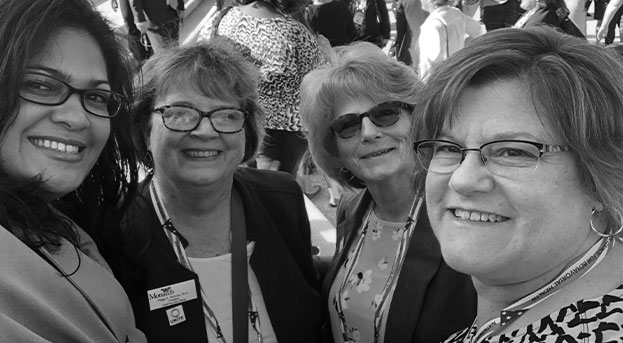
In Washington, D.C., last September, President and CEO Dr. Peggy Terhune joined Director of Integrated Care Monique Lucas, Senior Therapist Judith Chappell, Senior Executive Assistant Jeanette Wilhelm and Board Member Kara Guerriero (not pictured) for Hill Day 2019.
Organized by the National Council for Behavioral Health, Hill Day is the largest behavioral health advocacy event of the year. The event brings together hundreds of behavioral health providers from mental health and addiction organizations nationwide, executives, board members, people supported and community stakeholders for sessions and workshops on federal behavioral health policy. After the sessions, attendees take their messages to Capitol Hill to advocate for better resources for mental health and addiction treatment in their local communities. Our team shared information about our Certified Community Behavioral Health Clinic (CCBHC) in Stanly County and other critical Monarch services in North Carolina.